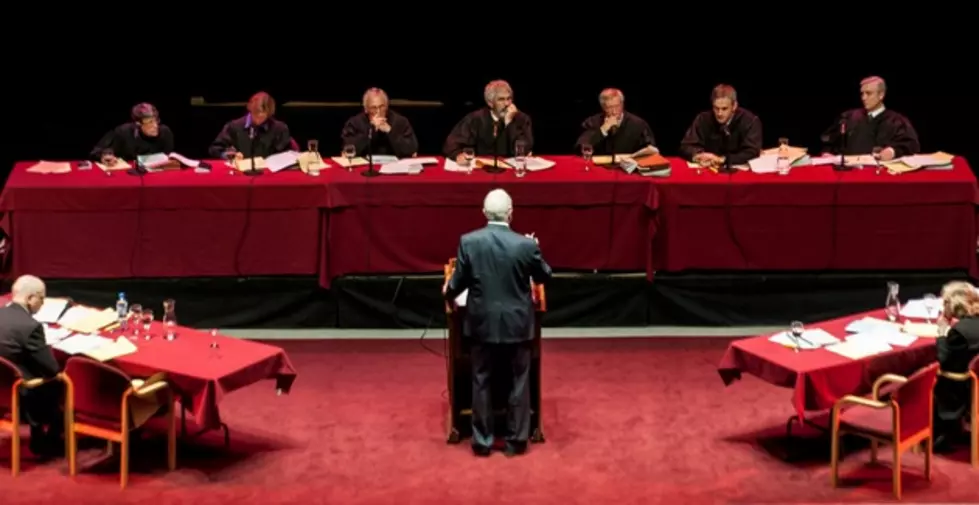
Expert Witness in Psychology Explains Victim Behaivor — Though Has No Knowledge of Jordan Johnson Case
During pretrial proceedings the defense tried to keep Dr. David Lisak from the prosecution's witness list.
Although he helped jurors understand that all rape victims behave differently, and that actions that seem odd to others really aren't that odd to a rape victim, he had no knowledge of the Jordan Johnson sexual assault case.
Lisak, a clinical psychologist and forensic consultant who recently retired from teaching at the University of Massachusetts, said he has put a total of about 10 hours into this case. He said none of that time included getting any facts, details or descriptions of any kind regarding this case. He used two to three hours of that time to put together a report for which he was in court to testify on today, Feb. 14, 2013.
He explained that well over 80 percent of rapes are not stranger rapes before going on to explain that sexual deprivation is not usually a characteristic of a rapist. Instead, those acts are usually fueled by characteristics like power and anger.
However, Lisak also told the court that characteristics of a person are not a good basis to judge whether or not someone is a rapist.
"There is no profile to say that someone is, or that someone isn't a rapist," Lisak said.
He followed that statement by agreeing that even a polite, successful or timid person could be a rapist.
Lisak went on to answer more questions from the prosecution, this time about how victims react in moments of feeling threatened and in traumatic situations. He explained that the initial response is usually to freeze, then flee and fight. He said that often times the responses happen so fast that a person could go into a feeling of helplessness or shock.
Also, according to Lisak, many victims reported placating their assailant to avoid greater harm. He said that due the the personal nature of sexual assault that victims go into a state of fear that they may actually be killed event though there is no actual threat of deadly violence.
Lisak said that there is a lot of back and forth that comes with the aftermath of rape. There can be outcry or none, and confusion.
"Victims of non-stranger rape are very confused about what happened to them," Lisak said, adding that there's a lot of back and forth with thoughts and feelings regarding their responsibility in the act.
Lisak also testified that a lot of traumatic memories are initially fragmented, and it isn't until a short time later that the victim can explain what happened to them accurately.
As for reactions, Lisak said those too are unpredictable and run the gamut.
He said the behaviors seen from victims "are very likely going to be different than what you expect. There's an enormous variability in how they react."
He said this includes doing things like driving the person who raped you home afterward, which is exactly what the alleged victim did in this case. Lisak said that is not uncommon, and in fact, he's heard of it happening a lot.
"It's hard to understand from outside of the experience," Lisak said. "These types of incidences are outside of most people's experiences.
He also said that it isn't uncommon for a victim to later blame him or herself, especially in acquaintance rape, as it is the person's way of protecting themselves from having it happen again. They figure if they fix this or don't do this or that next time, that it won't happen again.
Kristen Pabst With the Defense
While Lisak gave the jury plenty to think about in regard to the alleged victim in the Johnson case, defense attorney Kristen Pabst pointed out that he knew nothing of this case and that one can not assume that the woman in this case behaved the way she did because she was raped, as that has not been decided yet.
Lisak admitted that only about 5 to 10 percent of the testimonies he gives in court are in cases that he knows nothing about. Testifying in court as an expert witness is part of what Lisak does in his career. He is charging $325 per hour to work on this case.
Additionally, Lisak confirmed that much of his sexual assault-related work is focused on males.
He also admitted that he was sexually assaulted as a child, though he said that does not affect his work.
Later in questioning with the defense Lisak agreed that irrational fear can be triggered by precious incidences, not just immediate threats.
In the next series of questions Lisak addressed the act of giving consent. When asked if there is more than one way to give consent, he said there is. He said that there is a danger with many forms of consent, as they are based on how the other person receives them.
Lisak also confirmed during questioning from the prosecution that it is not just non-consensual sex that people react in varying ways to, but all types of sex.
Live coverage of the trial is being provided via Twitter from KECI
More From KMMS-KPRK 1450 AM
![[PHOTOS] Excited Bobcat Fans Welcome College Gameday to Bozeman](http://townsquare.media/site/15/files/2022/11/attachment-Gameday-Bus.jpg?w=980&q=75)







![University of Montana – Jon Krakauer Back In Court – State Headlines [YouTube]](http://townsquare.media/site/119/files/2015/07/Jon-Krakauer-in-Missoula.jpg?w=980&q=75)
